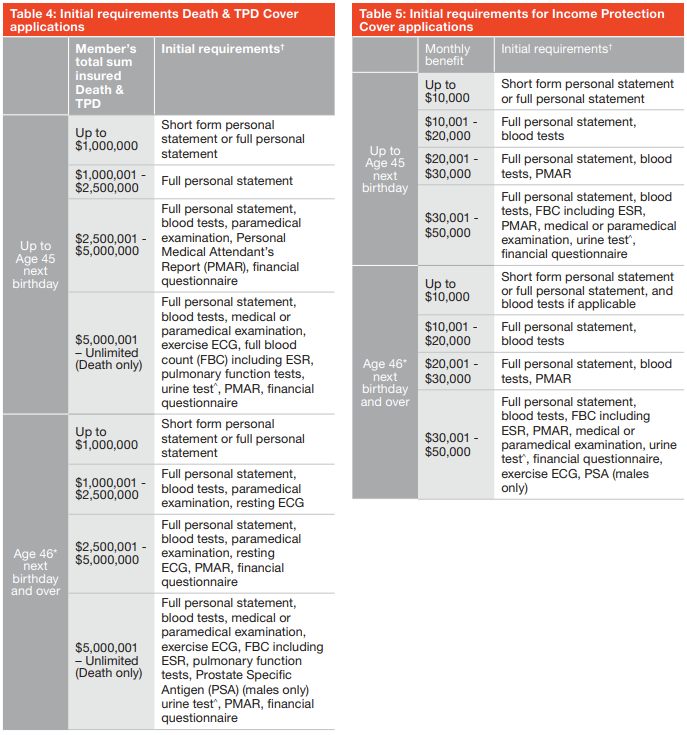Underwriting requirements
Depending on the level of cover you apply for, our insurer may have different medical requirements to assess your application. The following tables outline the initial requirements.
You’ll be advised when any medical tests or examinations are required. Once all the information is supplied to our insurer and they have assessed your application, we will advise you of the outcome.
Our insurer may accept cover, place exclusions on cover, charge higher premiums or decline your application. If within 60 days of the commencement of cover you advise TelstraSuper in writing that you wish to cancel the cover, any premiums deducted will be refunded to your account.
*Any member aged 55 and over will need to complete a full personal statement
^ Urine test means a microurinalysis.
Terminology |
Meaning |
| Short form personal statement or Full personal statement | An application form to increase your life insurance cover and you will be asked questions about your occupation, health and lifestyle. The insurer will consider your medical history, lifestyle activities, sports you engage in and occupation to determine if they’ll accept your cover or not, apply a loading or place an exclusion on your policy. |
| Blood tests | Blood tests can be used to assess your general health, as well as help your doctor diagnose or monitor a range of conditions. A blood test is a laboratory analysis performed on a blood sample that is usually extracted from a vein in the arm using a hypodermic needle. |
| Paramedical examination | A paramedical examination by either a registered nurse or specialist (if required). It usually includes the recording of height, weight, blood pressure and pulse. The exam may also include the collection of blood, urine, oral fluid, and an EKG and/or X-ray, depending on the insurer’s underwriting guidelines for your age and insurance amount. |
| Personal Medical Attendant’s Report (PMAR) | Medical report that is completed by your usual GP, medical centre or treating specialist that the insurer requests. The report can also include specific questionnaires to be completed- for example, a diabetes questionnaire or musculoskeletal questionnaire. While these reports typically do not require you to attend any consultation for it to be completed, there are instances where, at their own discretion, the GP, medical centre or specialist will ask you to visit them for the report to be completed. |
| Financial questionnaire | For large sums insured insurers require additional information to provide as clear a picture as possible for the underwriter to understand the client’s financial situation, why cover is required and how the level of cover was calculated. |
| Resting ECG | The resting ECG can indicate certain heart conditions such as hypertrophy of heart, ischemia, myocardial infarction, sequelae of myocardial infarction, cardiac arrhythmias, etc. The resting ECG is a simple, quick and painless test. The test takes about 5 minutes and no preparation is necessary. |
| Exercise ECG | A test to measure the electrical activity of the heart. Leads are fixed to certain points of the client’s chest, wrists and ankles to measure the heart’s electrical impulses. This test is performed when the client is exercising, either on a treadmill or exercise bike. |
| Full Blood Count (FBC), including Erythrocyte Sedimentation Rate (ESR) | A full blood count is a common test that may be used to help diagnose a wide range of illnesses, infections and diseases. This test gives information about the numbers and development of cells in your blood (including haemo-globin, red and white blood cells and platelets). Abnormalities may indicate anaemia, infection or some blood cancers, such as leukaemia. |
| Pulmonary function tests | Pulmonary function tests (PFTs) are non-invasive tests that show how well the lungs are working. The tests measure lung volume, capacity, rates of flow, and gas exchange. |
| Prostate Specific Antigen (PSA) – men only | Prostate-specific antigen, or PSA, is a protein produced by normal, as well as malignant, cells of the prostate gland. The PSA test measures the level of PSA in a man’s blood. For this test, a blood sample is sent to a laboratory for analysis. |
| Urine test | A urinalysis (also known as a urine test) is a test that examines the visual, chemical and microscopic aspects of your urine (pee). They can be used to find health issues and screen for or monitor certain common health conditions, such as liver disease, kidney disease and diabetes, and to diagnose urinary tract infections (UTIs). You will need to urinate into a special plastic jar. |

